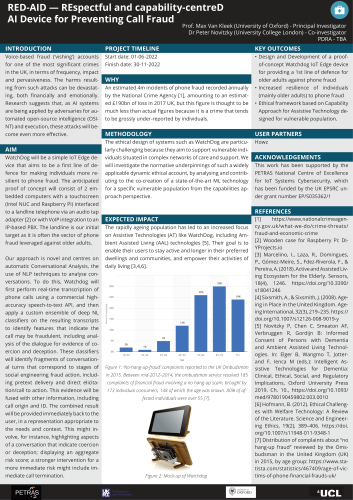RED-AID: REspectful and capability-centreD AI Device for Preventing Call Fraud
AIM
The RED-AID project has developed a conceptual home edge IoT device called WatchDog with the aim of addressing the issue of voice-based social engineering attacks. By applying a novel theoretical framework based on respectful design principles of interactive AI systems (work that resulted partially from the PETRAS project RETCON), RED-AID aims to develop an actionable ethical framework focusing on capabilities-centred systems design for individuals with impaired autonomy.
WHY
Voice-based social engineering attacks constitute a large and growing proportion of an expanding industry of digitally-accelerated fraud. The harms resulting from such attacks can be devastating, both financially and emotionally. Research suggests that, as AI systems are being applied by adversaries for automated open-source intelligence (OSINT) and execution, these attacks will become even more effective. Older adults with mild cognitive impairment (MCI) remain one of the top, and largely defenceless, targets for such attacks.
HOW
WatchDog monitors, transcribes, and analyses real-time landline phone conversations. Building on models of social engineering attacks, WatchDog identifies attacks by looking for clues in the dialogue (e.g., coercion, flimsy attestations), to provide a means of immediate mitigation. WatchDog also provides retrospective memory support, serving as a private diary of conversations to help individuals review (together with family members/carers) key details of whom they spoke to and what they disclosed. With RETCON, reaching initial validation of the WatchDog concept (TRL 2), the objective of the RED-AID project is to realise an operational prototype suitable for an initial field trial (TRL 5/6). This will occur in close collaboration with user groups and cybersecurity/fraud and other expert stakeholders to understand key user-needs and possible acceptance barriers related to these. By using a multidisciplinary approach, the key deliverables of RED-AID will include the open-source codebase for WatchDog, the first open vishing dataset, a paper related to construction of the detection model, and papers relating to the development and application of the respectful and capability-centred design methodology.
The RED-AID poster displayed at the PETRAS Academic Conference | Networking Research Showcase on 16 June 2022:


